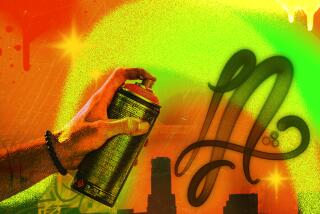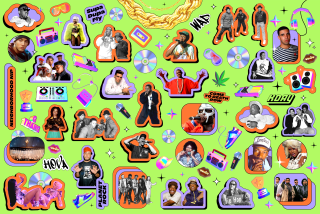Israeli music warms up to controversy
- Share via
JERUSALEM — “The land absorbs our blood and tears,” raps a local hip-hop star, but the person “has yet to be born who can stop the state of Israel.”
Hip-hop, rooted in the urban ghettos of the United States, has become the voice of defiant Israeli youngsters whose social life has been jolted by suicide bombings in cafes, pubs and discos during a Palestinian uprising.
“Hip-hop used to be too out there, too extreme, too nonconformist for the Israeli public,” said Gad Gidor, artist and repertoire manager at Israel’s Helicon Records. “Nowadays, it is like the rock ‘n’ roll of Israel because [hip-hop performers] dare to speak about things commercial artists don’t.”
Take Subliminal and the Shadow, whose black album cover shows a muddy hand clutching a Star of David, a symbol of the Jewish state. “United we stand, divided we fall” is the theme of the popular album.
More mainstream Israeli singers do not ignore the more than 2-year-old uprising but prefer to raise issues in a less confrontational style.
“They are not using it to raise the flag. Established artists are afraid of doing that because the country is too divided and they are bound to lose some audience if they are too clear about their opinions,” Gidor said.
Shalom Hanoch, a rocker in his 50s, recently left an exit sign lighted on stage for an entire concert, pointing to it and noting: “That is what we should do, but this is not a political concert.” Hanoch was referring to an Israeli withdrawal from land it occupied in the 1967 Mideast war.
Young hip-hop artists, however, can be more vocal than musicians like Hanoch because they have little to lose and can establish a following by sounding a political note.
Subliminal and the Shadow strike right-wing themes in their music. Their album incorporates a folksong from Hanukkah, the Jewish festival of lights, celebrating the victory of the biblical Maccabee rebels over the Greek Syrian Seleucid empire.
“We have come to banish the darkness,” the song goes.
On the other side of the political spectrum, rapper Mook E slams Israel’s occupation of land that Palestinians want for a state in the West Bank and Gaza Strip. “Everyone is talking about peace but no one is talking about justice,” note the lyrics of one Mook E song.
Although hip-hop is popular among the youth, older Israelis are looking for more escapism in their music, said Izhar Ashdot, a recording artist and producer. Pop songs written 10 to 20 years ago are seeing a comeback, which Ashdot attributes to a hunger for “a period in memory that seems better than today.”
Riding this wave of nostalgia is “Our Path Is Not Easy,” a cover of an old love ballad released last year. It has become an unofficial anthem.
“The song was adopted to the national situation. With all the [Palestinian] attacks, it came at the right place at the right time, when there is not a lot of new music being written,” said Yossi Cahana, an Israel Radio music editor.
More to Read
The biggest entertainment stories
Get our big stories about Hollywood, film, television, music, arts, culture and more right in your inbox as soon as they publish.
You may occasionally receive promotional content from the Los Angeles Times.










